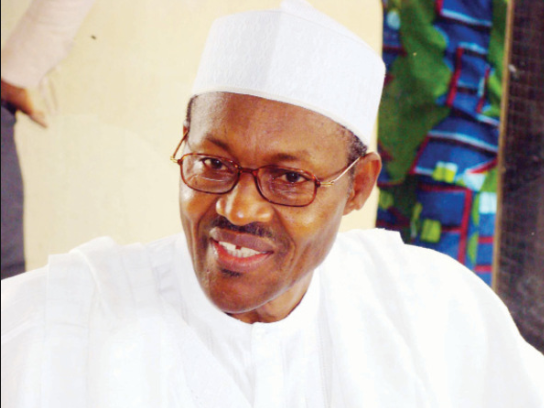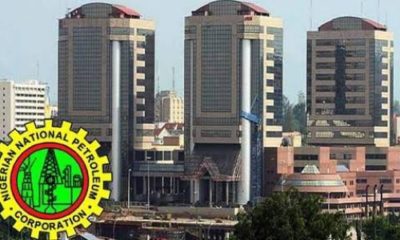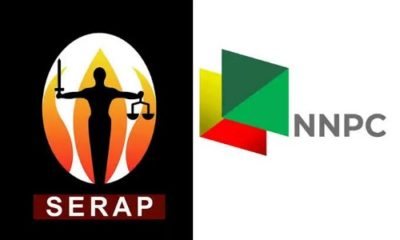Oil
Stolen Oil funds: President Buhari demands Fuel imports as payback from implicated oil marketers

ABUJA-Facing a huge cash crisis, President Muhammadu Buhari has resorted to unusual strategies for recovering some of the funds stolen from Nigeria’s treasury through a series of shady deals between former Petroleum Minister Diezani Alison-Madueke and a group of indigenous oil companies and oil marketers she and former President Goodluck Jonathan favored.
Former Governor of the Central Bank of Nigeria, Sanusi Lamido Sanusi, brought the part of the illicit deals to public attention when he alerted Nigerians that the Nigerian National Petroleum Corporation (NNPC) had failed to deposit $20 billion of oil revenues with the CBN. In addition, Mrs. Alison-Madueke had inked some deals, with the blessing of former President Jonathan, involving oil swaps and the transfer of certain oil wells reclaimed from multinational oil companies to shady Nigerian operators, including Jide Omokore and Kola Aluko.
An investigation by SaharaReporters discovered that President Buhari’s administration has begun the difficult and complex process of retrieving some of the missing petro-billions. One approach so far adopted by the new president is aimed at addressing the fuel scarcity that has harmed the Nigerian economy and threatens to paralyze the country’s economic activities, according to highly placed officials in the government.
But one exception involves Mr. Omokore whose Atlantic Atlantic Energy Oil Company was involved in the controversial concession of oil wells. A source at the Presidency told SaharaReporters that Mr. Omokore had volunteered to return $500 million to the Federal Government. However, the source added that President Buhari nixed the deal based on information that Mr. Omokore, believed to be a front for Mr. Jonathan and Mrs. Alison-Madueke, is in possession of $4.5 billion of funds that should have been deposited in the federation account.
The sources told SaharaReporters that the government’s immediate strategy involved targeting oil marketers and companies “caught red-handed in stealing huge sums of oil subsidies and oil revenues.” The government has pressured these companies and their owners to agree to repay the stolen monies traced to them by immediately importing more fuel into Nigeria.
The sources said the Buhari government has recorded significant early success in getting some oil marketers and their companies to accept the fuel-for-funds deals. “A number of them have agreed to import massive levels of fuel in lieu of the funds they received in shady transactions during the Jonathan administration,” one Presidency source claimed.
Another source revealed that the administration had started out by putting pressure on former Petroleum Minister, Diezani Alison-Madueke. She was reportedly quick to deny responsibility for the illicit deals with the oil marketers. Instead, she squealed on her subordinates in the NNPC, accusing them of structuring and doctoring the deals that robbed Nigeria of billions of dollars.
“The [Buhari] government got her to write a formal account of her allegations against some NNPC officials and oil companies. What she put down gave a picture of how some of the funds went missing. The document was then forwarded to the Economic and Financial Crimes Commission (EFCC) in the form of a petition,” one source said.
Mrs. Alison-Madueke’s “petition” reportedly named all the persons involved in the massive fraud in the oil sector, including some past and serving officials of the NNPC. Our sources said those she implicated in the NNPC include the current General Managing Director (GMD), Haruna Momoh, a former GMD, Austen Oniwon, Reginald Stanley and Sam Okeke, a former Group General Manager, New Business Division of the NNPC.
An EFCC source told SaharaReporters that a crack team of investigators was currently working on the former minister’s petition. He said the document had revealed new facts previously unknown by EFCC agents and Nigeria’s intelligence officials at Department of State Services (DSS). Among the scams disclosed by the former minister is information that at least four companies involved in an oil swap deal had not accounted for huge sums that should have been remitted to the account of the Nigerian government.
Among the companies implicated in her “petition,” Transfigura was reportedly unable to account for $80 million, Televeras $111million, while Aiteo apparently gulped down $150 million. Other oil firms named in the defrauding of the Nigerian people are Ontario, which failed to account for $135 million, and Sahara Energy, accused of skipping the payment of $120 million to the government.
Our EFCC source revealed that two companies, Transfigura and Sahara Energy, had made some gesture towards paying back some missing funds. However, a source at the Presidency told our correspondent that “so far the reconciliation has involved just paperwork and has not scratched the heart of the scam.” Investigators described Aiteo and Ontario as particularly problematic because they have completely cooked their records. An investigator also disclosed that the two companies are most directly linked to Mrs. Alison-Madueke and former President Jonathan. Both Ms. Alison-Madueke and Mr. Jonathan are currently in the UK, with the former Petroleum Minister reportedly undergoing a weeklong cancer therapy.
Some of the companies have agreed in principle to return the funds by bartering imported fuel for the funds they acquired illegally.
Our sources disclosed that other downstream companies caught in the storm of missing and stolen funds include Forte Oil, owned by businessman Femi Otedola, Folawiyo Energy, and, Oando, owned by Wale Tinubu and Honeywell Oil Company owned by Oba Otudeko.
Officials of the Buhari administration declined to give official confirmation of the stolen assets recovery process relating to other officials of the Jonathan Presidency.
Saharareporters-
Oil
NNPC Discovers Over 4,800 Illegal Pipeline Connections

The Nigerian National Petroleum Company (NNPC) Limited has revealed the detection of more than 4,800 unauthorized connections on oil pipelines within the country, painting a troubling image of the nation’s primary source of revenue.
Mele Kyari, the Group Chief Executive Officer of NNPC Ltd, communicated this information to the Senate Committee on Appropriations last Friday.
He said, “We have over 4,800 illegal connections on our pipelines. That means in some lines, within 100 kilometres of pipelines, you have as much as 300 insertions.
“Therefore, even when you produce the oil, you cannot deliver them at the required pressure and therefore the volume will also be less.”
As per the NNPC Ltd chief, individuals from various regions enter the Niger Delta, inserting unauthorized connections on pipelines in Nigeria’s oil-producing area.
This recent revelation follows a prior discovery of 295 illegal connections to the pipelines by the firm a year ago, underscoring the escalating issue of crude oil theft in Nigeria.
Two years earlier, Kyari had highlighted the country’s daily loss of 200,000 barrels of oil, amounting to $13 million due to theft and vandalism.
He further stated “We have two sets of losses, one coming from our products and the other coming from crude oil. In terms of crude losses, it is still going on. On the average, we are losing 200,000 barrels of crude every day.”
After the discovery, Nigeria’s security forces pledged to enhance security around the country’s pipelines.
To bolster this, the Federal Government granted a multi-billion naira pipelines surveillance contract to Tantita Security Services, headed by former militant leader Government Ekpemepulo, also known as Tompolo.
Despite facing criticism for this decision, Senator Heineken Lokpobiri, the Minister of State for Petroleum, remains convinced that it was the appropriate course of action.
In August, following a tour of oil facilities in the Niger Delta, Senator Heineken Lokpobiri expressed gratitude to Tantita, commissioned by NNPC Ltd, for their ongoing work.
He also hinted at plans for further extensive endeavors in the future.
In 2021, after extensive debate and delays, the Petroleum Industry Bill was finally passed to attract increased foreign investment into the oil sector through amendments to regulations, royalties, and taxes.
Oil
Dangote Refinery Set To Begin Fuel Production With First Crude Arrival

Nigeria’s colossal $19 billion Dangote Refinery, after encountering several setbacks, is on the verge of kickstarting fuel production.
This achievement is heralded by the arrival of the first crude shipment, transported by the OTIS tanker carrying 950,000 barrels of Nigeria’s Agbami crude.
S&P Global, citing industry sources and tanker tracking data on spglobal.com, reported the tanker’s departure on December 6, en route to Lekki, the nearest land port to Dangote’s offshore crude receiving terminal.
Scheduled to reach its destination around 8 PM on December 7, the arrival of this shipment signifies the commencement of crude supplies for the refinery’s operations.
Chartered by the state-owned Nigerian National Petroleum Company (NNPC), the Suezmax tanker is an emblem of the initial crude supply to Dangote’s cutting-edge refinery, as disclosed by a West African oil trader familiar with the matter in the S&P report.
Even though the refinery was officially completed in May, the absence of domestic crude feedstock had hindered oil product manufacturing.
To address this, the NNPC, holding a 20% stake in the refinery, struck an agreement to provide 6 million barrels of crude oil as feedstock to the Dangote refinery in December.
This move aims to jumpstart operations and overcome the previous impediments.
Agbami, operated by Chevron, holds a prominent position among Nigeria’s major deepwater developments, producing around 100,000 barrels per day in the central Niger Delta.
Known for its light sweet crude qualities, with a specific gravity of 47.9 API and a low sulfur content of 0.04%, Agbami produces substantial amounts of naphtha and kerosene.
NNPC has chartered additional shipments from different Nigerian offshore fields to the refinery, marking the start of a sequence of planned crude supplies for the month, as mentioned by the oil trader.
Located on the outskirts of Lagos, Nigeria’s commercial hub, the Dangote Refinery encountered repeated delays since its 2013 announcement, despite significant installation progress in 2019.
The refinery, designed to handle multiple crudes simultaneously, targets three Nigerian crude grades—Escravos, Bonny Light, and Forcados. When operating at full capacity, it aims to produce 327,000 barrels per day (b/d) of gasoline, 244,000 b/d of gasoil/diesel, 56,000 b/d of jet fuel/kerosene, and 290,000 metric tons per year of propane/LPG.
Dangote’s operations starting signify Nigeria’s hopes to lessen its reliance on gasoline imports, addressing the deficiencies of its existing refineries undergoing repairs. This shift is poised to reshape Nigeria’s oil industry, potentially leading to gasoline self-sufficiency by the 2040s.
Dangote officials anticipate an initial output of 370,000 barrels per day (b/d), emphasizing jet fuel and diesel production.
Industry analysts, however, project the refinery to reach its full operational capacity by mid-2025, although potential delays remain a looming concern.
Oil
NNPCL Sets Dec 2024 Terminal Date For Fuel Importation

The Nigerian National Petroleum Company Limited (NNPCL) has announced intentions to cease importing refined petroleum products by December 2024, anticipating full operational functionality for all national refineries by that time.
Group CEO, NNPC Ltd, Mele Kyari, shared this at a meeting with Speaker Tajudeen Abbas of the House of Representatives, who advocated for the privatisation of Nigeria’s refineries on Thursday.
Projections indicated the national oil firm’s revenue could climb to N4.5 trillion by the conclusion of 2023. Moreover, the rehabilitation of the Port Harcourt Refining Company, managed by NNPCL, was slated for completion by December of the current year.
Meanwhile, Oil marketers verified on Thursday that the Port Harcourt refinery is set for operations, potentially starting in January 2024. They emphasized that once operational, this refinery could notably reduce the prices of refined petroleum products.
During the meeting in Abuja, Kyari asserted Nigeria’s intention to cease importing refined petroleum products by 2024, envisioning the country’s emergence as a net exporter of these commodities within the same year.
He outlined the plans for launching operations at the Port Harcourt, Warri, and Kaduna refineries.
Kyari reiterated that all refineries would operate at full capacity, ultimately paving the way for Nigeria to transition into a net exporter of petroleum products by the conclusion of 2024.
He attributed the inactivity of Nigeria’s refineries over the years to the petroleum subsidy, emphasizing that the removal of this subsidy was drawing significant private-sector investments into the sector.
Kyari said “I can confirm to you that by the end of December this year, we will start the Port Harcourt refinery; early in the first quarter of 2024, we will start the Warri refinery and by the end of 2024, Kaduna refinery will come into operation.
“This is the commitment we are giving today and you can hold us accountable for this. In 2024, many of the initiatives including the rehabilitation of our refineries and also the efforts of small-scale refineries, and the upcoming Dangote refinery, will make Nigeria a net exporter of petroleum products in 2024.
“We will no longer be talking about fuel importation by the end of 2024. I am very optimistic that this will crystallise.
Kyari promised that by the conclusion of 2023, the government’s anticipated revenue from the company would reach N4.5 trillion, emphasizing NNPCL’s adherence to the Petroleum Industry Act and its commitment to delivering value to shareholders.
Recall that in October 2023, it was reported that Nigeria’s monthly spending on the importation of Premium Motor Spirit, known as petrol, had reached approximately N843 billion due to NNPCL’s cessation of oil swaps.
In July of this year, the Nigerian Midstream and Downstream Petroleum Regulatory Authority reported that during the post-deregulation period, spanning June 1 to June 28, 2023, the country’s total petrol consumption amounted to 1.36 billion litres, with an average daily consumption of 48.43 million litres.
The average ex-depot price of petrol, sourced solely from NNPCL as the importer, stands at about N580 per litre.
However, both NNPCL and oil marketers declared on Thursday that this substantial oil import expenditure would soon diminish.
They anticipated a drop once the Port Harcourt refinery commences production of refined petroleum products from January 2024, barring any unforeseen circumstances.





















